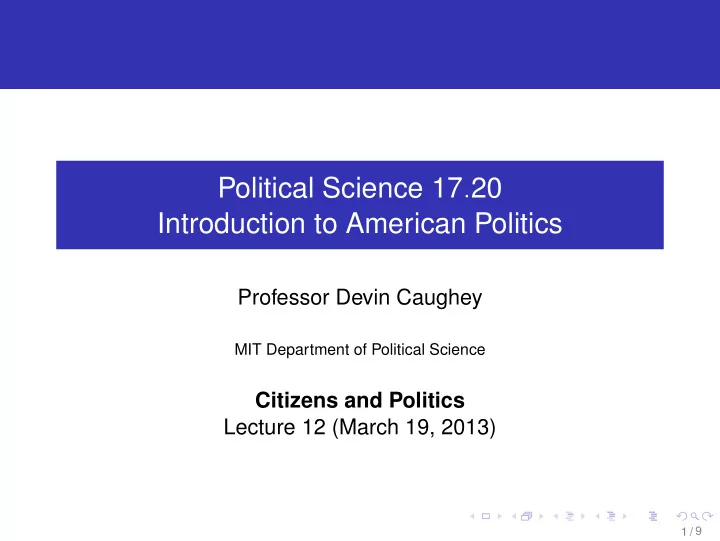

Political Science 17 . 20 Introduction to American Politics Professor Devin Caughey MIT Department of Political Science Citizens and Politics Lecture 12 (March 19, 2013) 1 / 9
2 Things Adam Berinsky Knows About Mass Opinion “Most people, most of the time, do not pay attention to 1 politics.” BUT. . . “Most people will answer any question you ask them.” 2 2 / 9
Case in Point http://www.youtube.com/watch?feature=player_ embedded&v=3gXOV_XWJck 3 / 9
Politics is a Sideshow in Most People’s Lives Unlike political elites (or political scientists), most people do not care very much about politics. They tune in episodically, if at all. Becoming politically informed is costly and provides little benefit to the individual. → “rational ignorance” 4 / 9
Belief Systems in the Mass Public Relative to political elites, ordinary citizens: have little knowledge of politics lack ideological consistency and constraint → “what goes with what” have many “nonattitudes” but few real opinions Better-informed citizens are more similar to elites, but perhaps this is just because they know what the “right” answer is. 5 / 9
Public Opinion Surveys Surveys are how public opinion is measured, but they also influence what they are measuring. Surveys are unusual and intrusive. Logic of conversation: If someone asks you a question, the presumption is that it is one you should have an answer to. People often construct answers on the spot → “nonattitudes” 6 / 9
Modeling the Survey Response Zaller’s Receive-Accept-Sample (RAS) Model: 1 Receive political information (depends on awareness) 2 Accept the information (depends on predispositions) 3 Sample from relevant considerations (depends on salience) If partisan elites (who transmit messages through the media) are polarized, then so will high-awareness (but not low-awareness) partisans. 7 / 9
The Malleability of Survey Responses Framing: Structure of political information and choices Agenda-Setting: Importance of issues Priming: Relevance/salience of different considerations Elite Cues: “What do you think of President Obama’s plan. . . ?” 8 / 9
Low-Information Decision-Making Heuristics: cognitively efficient decision shortcuts Party Incumbency Group Retrospective evaluation On-line processing Possibility of low-information rationality 9 / 9
MIT OpenCourseWare http://ocw.mit.edu 17.20 Introduction to American Politics Spring 2013 For information about citing these materials or our Terms of Use, visit: http://ocw.mit.edu/terms .
Recommend
More recommend